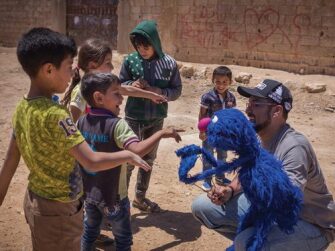
The Sesame Workshop and the International Rescue Committee, a refugee aid group, won a first-of-its kind $100 million grant from the John D. and Catherine T. MacArthur Foundation Wednesday for an ambitious education and outreach program designed to address the needs of displaced Syrian children.
The program was selected for the five-year grant from a list of finalists for the foundation’s 100&Change competition, which asked organizations to propose “bold solutions to critical problems of our time.”
“We are compelled to respond to the urgent Syrian refugee crisis by supporting what will be the largest early childhood intervention program ever created in a humanitarian setting,” MacArthur President Julia Stasch said in a statement. “Less than two percent of the global humanitarian aid budget is dedicated to education, and only a sliver of all education assistance benefits young children. The longer-term goal is to change the system of humanitarian aid to focus more on helping to ensure the future of young children through education.”
The program is designed to help children overcome the trauma of displacement and conflict. Sesame Workshop and IRC plan a three-pronged approach:
- A new, local version of the children’s program “Sesame Street,” which will be delivered on televisions and mobile platforms, “will help provide an estimated 9.4 million young children the language, reading, math, and socioemotional skills they need to succeed in school and later in life.” Familiar characters like Elmo and Grover will demonstrate concepts like gender equity, inclusion, and respect, a press release says.
- A home-visiting program will pair local community health workers with 800,000 caregivers to “promote caregiver responsiveness, early learning, mental well-being, and resiliency.” And that face-to-face work will be backed up with children’s books, training materials, toys, and mobile programming to help strengthen important adult relationships for 1.5 million of “the most vulnerable children,” the release says.
- The organizations will create child development centers that “will be equipped with storybooks, video clips on pre-loaded projectors, activity sheets, and training guides to enable age-appropriate, play-based learning.”
The program will build on a 15-month pilot project, which the organizations launched in January.
Some of the project’s strategies parallel efforts by a growing number of public schools and child welfare organizations in the United States, which have been fueled by research on the effects of adverse childhood experiences and toxic stress. Without intervention, scientists say such experiences—which include involvement in global events like humanitarian crises and personal events like the death of a parent—can actually alter a child’s brain development and lead to other negative health outcomes throughout their lives.
Among the biggest game changers for trauma-affected children are strong, consistent relationships with caring adults, researchers have found.
You can learn more about Sesame Workshop and IRC’s plans in this video, which was produced by the organizations.
Photo: Sesame Workshop
